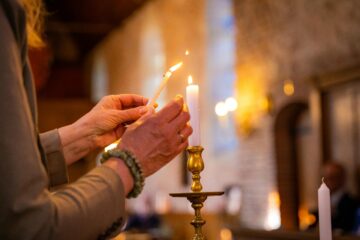Beloved brothers and sisters in Christ,
This past weekend, we celebrated Father’s Day, a day set aside to honor and give thanks for the men who have embraced the sacred vocation of fatherhood.
In the Orthodox Christian tradition, fatherhood is not simply a biological function—it is a spiritual calling. Just as we call our priests “Father,” so too are the fathers of our homes called to reflect the love, guidance, and mercy of God the Father, the first person of the Holy Trinity.
As Orthodox Christians, we do not separate the secular from the sacred. And so, while Father’s Day may be a cultural holiday, it offers us a rich opportunity to reflect theologically and spiritually on what it means to be a father.
Let us consider three important aspects of this sacred calling:
1. The Father as Icon of God the Father
St. Paul writes in Ephesians 3:14-15: “For this reason I bow my knees before the Father, from whom every family in heaven and on earth is named.”
This verse tells us that earthly fatherhood derives its name and meaning from God Himself. Fathers are called to be living icons—visible representations—of the invisible God. This is both a high honor and a great responsibility.
In our Orthodox churches, icons do not merely decorate; they reveal. They are windows to heaven. In the same way, the life of a father should be a window through which his children and his household catch a glimpse of the heavenly Father.
What does this mean practically?
It means that fathers should reflect the love of God: not conditional or performance-based, but constant, sacrificial, and unwavering. It means they must set the tone of mercy and forgiveness in the home, just as God receives each of us with compassion. And it means they must not provoke their children to anger or fear, as Paul says in today’s Epistle: “Fathers, do not provoke your children to wrath, but bring them up in the training and admonition of the Lord” (Eph. 6:4).
The icon of God the Father is most clearly shown in the Parable of the Prodigal Son—a father who allows freedom, waits patiently, forgives joyfully, and restores fully. Earthly fathers are invited to do the same.
2. The Father as Teacher and Priest in the Home
In Orthodox tradition, the home is called the “little church.” And in that little church, the father is called to be a kind of priest—leading the family in prayer, in Scripture, and in the life of the Church.
In Deuteronomy 6:6–7, God commands the fathers of Israel:
“These words which I command you today shall be in your heart. You shall teach them diligently to your children…”
It is not enough for fathers to be providers of food and shelter. They must also be providers of spiritual nourishment, modeling prayer, church attendance, repentance, and love for the sacraments.
Sadly, in today’s culture, many fathers have been spiritually silenced. But we must reclaim the vision of the father as educator in righteousness, guardian of the family’s faith, and the first preacher his children ever hear. Think of the great saints who were formed by faithful fathers: St. Basil the Great, whose father Basil the Elder taught the Scriptures and inspired an entire generation of saints. St. Silouan the Athonite, who credited his father with teaching him the simplicity and sincerity of prayer.
Fathers: even your smallest gestures—lighting a candle, blessing your children before bed, crossing yourselves before meals—these plant seeds of eternity in your family. Do not underestimate their power.
3. The Father as a Living Legacy of Faith
A godly father does not merely raise children—he raises disciples.
Legacy in our Orthodox faith is not just what we leave behind in material terms, but who we leave behind in spiritual terms. The goal of Christian fatherhood is not simply to raise successful, well-adjusted kids, but to raise saints—children who know Christ, love His Church, and serve their neighbor.
In 2 Timothy 1:5, St. Paul praises the faith of Timothy’s mother and grandmother—but what a gift when three generations of faith can be traced! When a father passes on the Faith not only by instruction but by example, he becomes part of an unbroken chain of salvation history.
Fathers must always ask:
“What kind of soul am I shaping in my child?”
“Will my children remember me more for what I said, or for how I lived?”
“Am I building an altar in their hearts where God can dwell?”
Your prayers, your patience, your repentance, your love—these are the spiritual inheritances you pass on, generation to generation.
Beloved in Christ, we offer prayers of thanksgiving for all the fathers among us:
For the young fathers, learning to lead with courage and grace.
For the seasoned fathers, who have guided their families through both storms and still waters.
For the spiritual fathers, the priests and mentors who shepherd souls with wisdom and compassion.
And for the fathers who have departed this life, whom we now entrust to the mercy of God and remember with reverence.
Let us not merely honor fathers with gifts or kind words, but also with our prayers, our obedience to God, and our gratitude for their sacrificial love.
To all fathers:
Be strong. Be faithful. Be loving. And know that your labor in the Lord is not in vain (1 Cor. 15:58). May the Lord, the Good Shepherd and the true Father of us all, strengthen you in your sacred calling. And may your families flourish in faith, in love, and in holiness.
Amen.



0 Comments